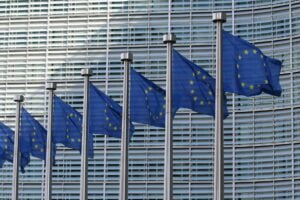This content was created by the Data Sharing Coalition, one of the founding partners of the CoE-DSC.
DenkWerk is an independent think tank that wants to contribute with powerful ideas to a prosperous, inclusive and progressive Netherlands. In its report “The online world.NL” and especially in its subsequent report “The data-driven future.NL“, DenkWerk warns against the increasing power of large tech companies from the United States and China. Their access to ever-increasing amounts of data – thus knowledge – means they also get hold of the key to innovation. In order to compete with these tech companies, European companies need more access to data sources. Not by generating more data, but by exchanging data. Hence, DenkWerk emphasises the importance of a strategy to realise the preconditions for data sharing on a large scale as quickly as possible. We elaborated on this with Frans Blom, Anna Wijers and Robert van der Veeken from DenkWerk, who believe that this challenge, similar to climate change, deserves more urgency and needs to be dealt with today rather than tomorrow
The challenge of creating one common data language out of many ‘dialects’
The position of power acquired by the big tech companies in the United States and China – called ‘data conglomerates’ by DenkWerk – is a threat to the competitive position of the Netherlands and Europe. Frans explains why. “Data conglomerates have access to large amounts of data, which has given them an enormous lead with regards to innovation. This data offers them a great deal of knowledge about the preferences of their customers, enables them to devise new propositions and develop integrated solutions.” According to Frans, this leading position of data conglomerates has two causes. “Due to their dominant position, data conglomerates already possess much data, which makes data sharing with other organisations less necessary. It is also easier for them to reuse this data. For example, they do not have to deal with GDPR legislation as it exists in Europe. Besides, the number of ‘data languages’ (taxonomies) in the United States and China is much smaller than in Europe. While many ‘data dialects’ exist in Europe, the data languages of the data conglomerates have become dominant in the United States and China. For Europe, data sharing is of high importance to keep up with these data conglomerates. However, this large number of taxonomies in Europe is one of the reasons that interoperability – a prerequisite for data sharing – is a much bigger challenge for European organisations.”
Rather today than tomorrow, Europe must come to a strategy to realise the preconditions for data sharing in order to compete with the rest of the world. “Especially when it comes to innovation.” Anna emphasises. “When companies in Europe have less access to data sources, they also lack knowledge to come towards better propositions. With the danger of innovation being jeopardised: a new idea in Europe will get off the ground much later since data conglomerates can bring better propositions to the market more quickly.” Regulation only can never be the answer, according to Frans: “Europe could decide, just like China did, to completely shield its data from the rest of the world. But in the end that will not stop data conglomerates from creating better propositions. They can also develop these on the basis of non-European data. Hence, you don’t protect your competitive position with regulation only.”
Europe must come to a strategy to realise the preconditions for data sharing in order to compete with the rest of the world.
The Netherlands cannot and must not wait for Europe
“Although a major challenge, Europe must find a way to facilitate data sharing.” says Frans. “Common agreements for data sharing that provide the trust to actually start doing it will certainly help.”
According to DenkWerk, the Netherlands can take the lead in working towards agreements about data sharing. Agreements that other countries in Europe can then adopt. Frans: “Of course it would be better to realise data sharing on a European scale than at a national level. However, if we handle this at a European pace, we are eight or nine years from now. Then it is too late and we have missed the boat.” Robert: “The Netherlands can be a front-runner in Europe and must also take up that position. There is a great deal of knowledge about data sharing in our country, which means that the Netherlands can be a leader in how we share data in Europe. An initiative such as the Data Sharing Coalition is doing a good job, but not yet on the actual scale that is needed. More resources and an increase in participation of organisations are needed for that.”
A growing sense of urgency must lead to action
DenkWerk emphasises that both the government and the business community must move much faster than they do now. Frans: “From my point of view, data sharing will never get off the ground without a proactive government that helps enforce choices for standardising data language. However, if you ask me, our government is still too cautious about this and believes that the business community itself should take the lead here.” Robert: “At the same time, companies need to make data a core part of their strategy. Frans: “And as difficult as that may be, companies should think beyond their own business interest and take the general interest more seriously. By, for example, no longer perceiving sharing data with a competitor as a risk, but rather as an opportunity to mutually benefit from.”
The notion that data sharing is no longer a choice, but a pure necessity is growing in both the Netherlands and Europe. Robert: “Thanks to the European Data Strategy and Governance Act, as well as the Dutch Digitalisation Strategy, data sharing is moving higher on the agenda. Frans: “But just paying attention to the subject is not enough. Action is needed. Hopefully, our latest report helps to address this urgency again.”




